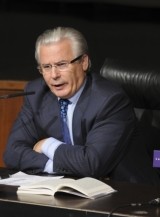By Eduardo González*
The Spanish Supreme Court has cleared Judge Baltasar Garzón of the charge he abused his judicial powers by investigating the thousands of deaths and disappearances during the dictatorship of General Francisco Franco. This is good news only in that it does not worsen the difficult legal situation in which the famous judge already finds himself. The verdict is a disappointment for the victims of Francoism and confirms Spain remains unwilling to deliver justice for the crimes of the past.
The Supreme Court recognized the legitimacy of the demands by relatives of the victims, who according to the decision have a “right to truth” (also known in other countries as the “right to know” or the “right to mourn”) about what happened to their loved ones and are justified in seeking effective legal recourse. The judges decided by a majority that by opening an inquiry, Mr. Garzón was merely responding to this demand, but he used a doctrine the Supreme Court does not share and described as an “error.” Unfortunately, the decision opted for a weak interpretation of the right to truth, limiting it to the merely academic study of “historical truth” open to interpretation and debate by historians, not judges.
The judges decided courts are restricted to determining the “legal truth” of a defendant’s criminal responsibility and nothing more. They rejected Garzón’s assertion that international law overrules a national amnesty, and said victims must accept the domestic legal framework negotiated by Spanish politicians more than a generation ago. Such a conservative position is inexplicable in a country where, precisely because of a flawed legal framework, an official figure for the number of dead and disappeared does not even exist.
|
It is also inexplicable that the Supreme Court reduces the demands of victims’ relatives to a merely academic study of “historical truth.” The relatives have said loudly and clearly that they do not want a history book for their shelves; they want to know where their relatives are and to be able to mourn. Their claim is universal throughout history and humanity, and reminds us of Antigone’s plea in Greek mythology for King Creon to permit her to give her brother with a dignified burial. |
The Supreme Court has effectively decided the legal identification of the disappeared is not an issue the Spanish legal system is competent to determine. The court refused to consider the option of “truth trials,” legal proceedings to investigate facts, such as those held in Argentina while amnesty laws were in force. The decision was purely dogmatic. King Creon’s cruelty was fuelled by the emotions fresh from a war. These judges have been far more calculating.
Perhaps this trial will be remembered not for the acquittal, but as the first time relatives of the victims had the opportunity be recognized as such before a court in their own country and to testify—albeit as part of Garzón’s defense. But it is dismaying to note the court heard their voices only as a kind of inventory, directing them to try their luck in the vagaries of parliamentary politics and offering a condescending lecture on criminal law.
It is a sorry situation for the Supreme Court to declare itself powerless to uphold a basic principle of a civilized nation. It has reduced Garzón’s effort to uphold justice to an error of interpretation, a poor job by a misguided student. A dissenting judge—who would have condemned Garzón—waxes indignantly about even having to listen to the relatives of victims. He regarded their evidence as a waste of time: that it was shameful to imply the judges would not believe the validity of the victims’ rights. But, like the majority of judges, his way of recognizing their rights was to deny them.
I suppose if the victims’ families had a second chance to appear before the Spanish court they would echo Antigone’s words that unjust laws cannot “override the unwritten and unfailing statutes of heaven. For their life is not of today or yesterday, but from all time.” As long as Spain persists in playing a cruel King Creon, claiming to be powerless to correct his own injustices, this tragedy will never end.
Eduardo Gonzalez is the Director of the Truth and Memory Program at the International Center for Transitional Justice.
Photo of Baltasar Garzón courtesy of Casa de América.
